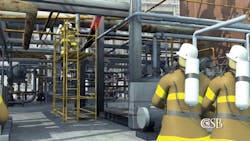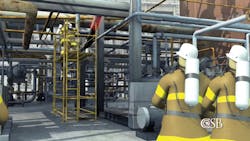Operations: Safety Under Scrutiny at Refineries, Chemical Operations
California moved a step closer in February to strengthening oil refinery safety regulations in the state. A new report, "Improving Public and Worker Safety at Oil Refineries," was issued by the state's Interagency Working Group on Refinery Safety, which was formed following a serious chemical release and fire at Chevron's oil refinery in Richmond, Calif., in August 2012.
Ironically, the final report was released one day after an accident at a northern California refinery operated by Tesoro Corp. in which two workers were injured.
Implementation of some of the report's recommendations already has begun. For example, refinery inspectors have been hired to ensure refineries comply with health and safety laws, and a new reporting system was established to improve oversight, according to California's Environmental Protection Agency.
See Also: Operations Management Strategy & Best Practices
Rafael Moure-Eraso, chairperson of the U.S. Chemical Safety Board, an independent federal agency that investigates chemical accidents, issued a statement applauding the findings and recommendations in California's final report, noting that several are aligned with the CSB's own recommendations released in its April 2013 accident report of the Chevron incident.
The California group's recommendations include establishing clear criteria for unified response during emergencies, coordinating regulatory activities to avoid duplication and performing periodic safety culture assessments.
The recommendations also include requiring refineries to implement inherently safer systems "to the greatest extent feasible."
"The intent of inherently safer system requirements is to ensure that refineries incorporate the greatest degree of hazard reduction, to the maximum extent feasible, in order to avoid major accidents or releases," the report notes.
While the call for inherently safer systems aligns with CSB's own recommendations regarding refineries, its embrace by the chemicals industry is less than absolute. In January, 13 associations -- including the American Petroleum Institute and the American Chemistry Council -- sent a letter to the White House expressing their opposition to any proposal that would "create a federal requirement to assess or implement so-called Inherently Safer Technologies (IST)."
In part the letter stated, "Inherently safer approaches to manufacturing processes have been and will continue to be considered by facilities as a matter of course, and the facility operators -- not the government -- are in the best position to understand the full ramifications of implementing IST."
About the Author
Jill Jusko
Bio: Jill Jusko is executive editor for IndustryWeek. She has been writing about manufacturing operations leadership for more than 20 years. Her coverage spotlights companies that are in pursuit of world-class results in quality, productivity, cost and other benchmarks by implementing the latest continuous improvement and lean/Six-Sigma strategies. Jill also coordinates IndustryWeek’s Best Plants Awards Program, which annually salutes the leading manufacturing facilities in North America.
Have a story idea? Send it to [email protected].


